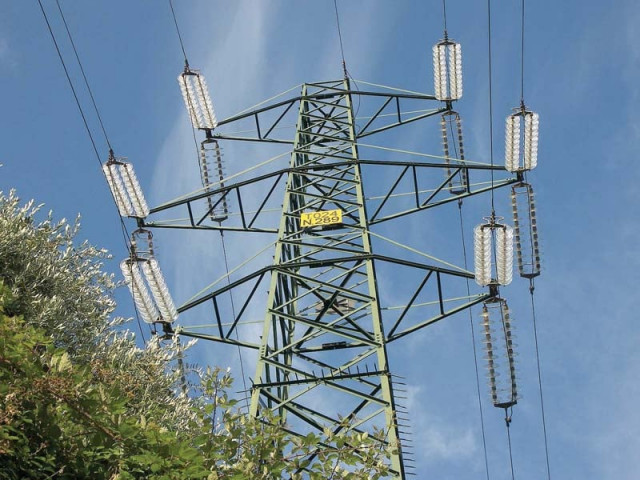Fuel price adjustment: Regulator cuts power tariff for June and July
Consumers using up to 300 units per month will not get the relief

The fuel cost of electricity delivered to distribution companies was calculated at Rs4.63 per unit in June against the reference price of Rs6.828 per unit, which suggested that the consumers should be returned Rs2.19 per unit. PHOTO: FILE
As oil prices remain persistently low in the international market, the National Electric Power Regulatory Authority (Nepra) has approved a reduction of Rs2.19 and Rs2.13 per unit in power tariff for June and July 2015, respectively for consumers of state-owned power distribution companies.
The approval was given at a public hearing here on Tuesday on the monthly fuel price adjustment mechanism attended by officials of the Central Power Purchasing Agency (CPPA) and the tariff section of Nepra.
The consumers will enjoy the lower tariff in electricity bills for October and November. However, domestic consumers, who consume up to 300 units in a month, will not get benefits of the tariff cut and will be paying a higher electricity price.
Read: OGRA proposes slashing fuel prices
This is the result of the federal government’s assurances to global lenders including the International Monetary Fund that the consumers receiving subsidy will not have their tariff reduced under the fuel price adjustment formula.
This consumer category came up for discussion in a meeting of a National Assembly standing committee last month during which Ghulam Mustafa Shah, an MNA from Sindh, asked Minister of State for Water and Power Abid Sher Ali to also apply the lower tariff to the consumers using up to 300 units of electricity per month. Interestingly, the state minister replied that he was not aware that such consumers were not eligible for refunds.

According to a petition filed by the CPPA with Nepra, the fuel cost of electricity delivered to distribution companies was calculated at Rs4.63 per unit in June against the reference price of Rs6.828 per unit, which suggested that the consumers should be returned Rs2.19 per unit.
The total volume of energy generated from all fuel sources stood at 9,926.9 gigawatt hours in the month costing Rs46.047 billion (Rs4.6387 per unit). However, the CPPA supplied electricity to the distribution companies for Rs44.592 billion (Rs4.6309 per unit).
The financial impact of transmission losses was recorded at Rs296 million or Rs0.1389 per unit.
In June, the electricity generated through high-speed diesel cost Rs15.62 per unit, residual fuel oil-based electricity cost Rs10.92 per unit, power import from Iran cost Rs10.20 per unit, mixed fuel cost Rs6.7 per unit, bagasse-based electricity cost Rs5.76 per unit, gas-powered electricity cost Rs5.7 per unit and nuclear power cost Rs1.18 per unit.
Through wind and solar sources, the country produced 52.89 gigawatt hours and 13.95 megawatts respectively, but Nepra did not divulge the power generation cost from these renewable energy sources.
Commenting on the wind and solar power generation, a Nepra official suggested that the cost of electricity from both sources should be part of the price basket.
In July, power generation from all fuel sources was estimated at 10,627 gigawatt hours costing Rs45.123 billion (Rs4.246 per unit). However, the CPPA delivered 10,352 gigawatt hours of electricity to the distribution companies at a cost of Rs45.094 billion (Rs4.3559 per unit).
Read: Cheap oil not a deterrent to wind energy solutions
Transmission losses in the month caused a financial impact of Rs273 million or Rs0.1127 per unit.
During the hearing, Nepra, however, voiced concern over delay in filing tariff revision petitions by the CPPA for June and July. It said legal action would be taken over the late submission of petitions that deprived the consumers of timely relief.
Published in The Express Tribune, September 16th, 2015.
Like Business on Facebook, follow @TribuneBiz on Twitter to stay informed and join in the conversation.



















COMMENTS
Comments are moderated and generally will be posted if they are on-topic and not abusive.
For more information, please see our Comments FAQ